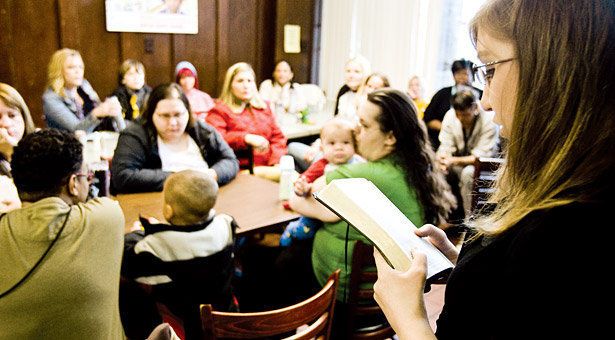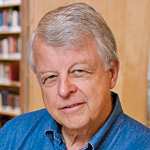A Biblical Vision for Urban Ministry
A Conversation with Raymond Bakke
By Jeffrey Overstreet (jeffreyo@spu.edu)

You've studied cities in the biblical text extensively. What models of urban ministry do you see in Scripture?
One model is Antioch, the earliest Christian church we know anything about in the New Testament. They had a staff of five people (Acts 13:1). Two of them were Africans: Simeon of Niger and Lucius of Cyrene, which is in North Africa. The others were Barnabas from Cypress; Manaen, the Palestinian politician who became a Christian; and Saul, the European-trained Jew.
So you have three continents represented on the inner-city pastoral team, reaching people other than ethnic Jews. The inclusion of Greeks and others seemed to surprise the church in Jerusalem, who sent Barnabas to check it out. City churches today take for granted social and cultural pluralism, but they do not always diversify staffing to make genuine congregational pluralism possible.
Then there was the Apostle Paul. It became the norm for Paul to go only to cities. His missionary journeys followed the contours of the urbanized world. He didn't go anywhere else. The smallest place that we know he went to is Thessalonica.
"As an evangelical, I'm committed to the evangelization of persons, but I'm also committed to the social transformation of places."
The whole Bible climaxes in the redeemed city, the Jerusalem of Isaiah 65, which is God's model city plan. In Isaiah 17–25, we're told to build the city. Then God says, "While you're building it, by the way, I'm also building a city, and it's going to look like that." From my studies, it became clear that if we want to orient our lives toward Heaven, we have to seed the transformation of our cities.
As an evangelical, I'm committed to the evangelization of persons, but I'm also committed to the social transformation of places. That became the theme of my ministry all over the world, in more than 200 cities where I went to do consultations with World Vision and the Lausanne Committee.
With this scriptural perspective, how do you counsel those with a heart for urban ministry to approach urban communities?
You don't go into a neighborhood and look for needs. When you do need analysis, then you automatically almost become the solution to the need. And you begin to see yourself as the messiah to fix the neighborhood.
Instead, I counsel people to go in and look for islands of strength, signs of hope. This is called "assetbased community development." It might be a woman who's doing the blood pressure check at the school, or a crossing guard. It's the things that are already going on there. You don't go in assuming that they don't have the right church, or they don't have this program, or they don't have this or that, and therefore they need you. If you approach the ghetto, you take off your shoes — it's holy ground. The Spirit's there before you get there. And you look to see what the Holy Spirit is doing.
We have to take the stained glass off the gospels and move into the ZIP codes of our city — not to run programs, but to build relationships and be models of healing and restoration.
"Jesus could have wired the universe with stereo on Mars and woofers and tweeters on Jupiter, and the angel choir singing to us about the gospel. But instead 'the Word became flesh and dwelt among us.' I still think that's the pattern for ministry."
I think Jesus is our model as well as our message because of the incarnation. Great preachers can come to us on a video screen. Jesus could have wired the universe with stereo on Mars and woofers and tweeters on Jupiter, and the angel choir singing to us about the gospel. But instead "the Word became flesh and dwelt among us." I still think that's the pattern for ministry.
In Walking on Water, Madeleine L'Engle quotes Emmanuel, Cardinal Suhard, saying, "To be a witness ... means to live in such a way that one's life would not make sense if God didn't exist." In other words, we'll be quietly counterintuitive or countercultural as we live out our faith and follow Jesus.
How do you think Christians can most effectively evangelize in the city?
Urban people have four worlds. They have the biological world of family; they have the geographical world of neighbor; they have a vocational world of work; and they have a recreational world of play. But the vocational world is the key one. If you ask urban people who they are, they don't tell you who they are, they tell you what they do.
I have been telling pastors for generations: If you really want to equip parishioners for evangelism, you go to their workplace; you go to their school, their factory, their office. Then, sit down and ask them, "Who are the four or five people that you work with every day, and what is their human need?" Maybe their kid is in trouble, or their marriage, their job, or their health. Caring responses begin at the point of such disclosures.
Evangelism is very simply "scratching people where they itch" in the name of Jesus. A little church of 100 people will have potentially hundreds of relationships with people who don't know Jesus. My task as a pastor is simply to turn Christians loose in their worlds.

For more than 50 years, Raymond Bakke '65 has helped shape the vision for urban ministry worldwide. He is author of The Urban Christian, Street Signs, and A Theology as Big as the City, and he serves as chancellor, Distinguished Professor of Global Urban Ministry, and member of the Board of Regents at Bakke Graduate University — an institution dedicated to developing "Christ-centered leaders who change global cities."
For two decades, 1959–79, Bakke pastored inner-city churches in Seattle and Chicago (see "Grace Note"). He served as senior associate for large cities with the Lausanne Committee for World Evangelism from 1979–95, and in 1989 — the year he was recognized as Seattle Pacific University's Alumnus of the Year — he founded International Urban Associates. Since then, he has led or helped lead urban ministry consultations in more than 200 large cities on six continents. Today he makes his home in Bremerton, Washington.
